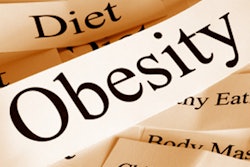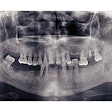
Oral healthcare professionals are uniquely positioned to be part of an interprofessional effort to intervene in the pediatric obesity problem, according to a new paper in the Journal of the American Dental Association (JADA). Because of their frequent contact with patients, dental professionals can complement and support weight screening and health behaviors, the authors noted.
Dentists, hygienists, and other oral healthcare professionals often have more frequent and regular contact with children than pediatricians, so they are in a position to monitor the changes in a patient's weight and body mass index (BMI) over time, according to the authors from Rutgers University.
"Weight screening in the dental office can promote healthy behaviors to improve weight and oral health status and reduce systemic and oral health risks," wrote Jane Ziegler, DCN, RDN, LDN, and Christopher V. Hughes, DMD, PhD (JADA, February 2016, Vol. 147:2, pp. 146-150).
Healthy body weight
The federal program Healthy People 2020 advocates healthy living and lowering the risk of chronic disease by eating a healthy diet, while achieving and maintaining healthy body weight. Children who are overweight or obese have a greater risk of being overweight as an adult, which increases their long-term risk of developing a chronic disease such as type 2 diabetes mellitus. Both obesity and type 2 diabetes are also associated with a risk of periodontal disease, studies show (British Dental Journal, July 12, 2013, Vol. 215:1, pp. 35-39).
“Weight screening in the dental office can promote healthy behaviors to improve weight and oral health status and reduce systemic and oral health risks.”
According to the U.S. Centers for Disease Control and Prevention (CDC), overweight for children is defined as having a BMI at or above the 85th percentile and below the 95th percentile for kids of the same age and sex. Childhood obesity is a having a BMI at or above the 95th percentile for kids of the same age and sex.
"Despite the lack of direct relationships between dental caries and BMI in children, the role of diet in dental caries and overall pediatric health is indisputable and could indicate that there is a role for the [oral healthcare professional] to provide diet and weight screening interventions," the authors wrote.
In a 2008 survey of pediatric dentists in North Carolina, investigators reported childhood obesity to be a major healthcare concern, and dentists were willing to assist in addressing this issue through practice initiatives (Journal of Pediatric Dentistry, 2008, Vol. 30:6, pp. 488-495).
Approaching weight screening at office visits
Because children and parents may be sensitive to weight-status screening, dental professionals should maintain empathy, nonjudgmental behavior, and privacy during measurements, the authors advised. They can explain that they are taking a greater role in health issues among patients, including preventing children from being overweight or obese, because diet, dental caries, and weight status may be associated.
Oral health practitioners should measure weight and height during the patient's first visit and at each six-month dental recall visit to assess weight status over time, the study authors recommended. Dentists and other practitioners should refer children to a registered dietitian nutritionist (RDN) or physician for follow-up when their BMI scores fall outside the normal ranges for their age and sex.
It is important for oral healthcare professionals to review with the patient and parents what the child's BMI percentile means and also any health implications of weight status outside of the normal range, in addition to recommendations for improving weight status, according to the authors.
What can dentists do?
Simple examples of advice to share with parents and children include limiting snacks between meals and minimizing drinking sugar-sweetened beverages to reduce both caries risk and consuming fluids and foods that contain empty calories.
The kids section of the ChooseMyPlate.gov website provides additional advice for healthy eating and exercise, and it is an excellent resource to share with patients, the authors noted. They also wrote that patients in low-income families or who have insecure sources of food can be referred to their primary care physician or a dietitian for additional resources or to appropriate social agencies.
"Healthy diet recommendations, discussion of chronic disease risks associated with weight status, and referral to a primary care physician or an RDN for further follow-up as needed can assist in the prevention and reduction of obesity and oral health risks," the authors concluded.



















